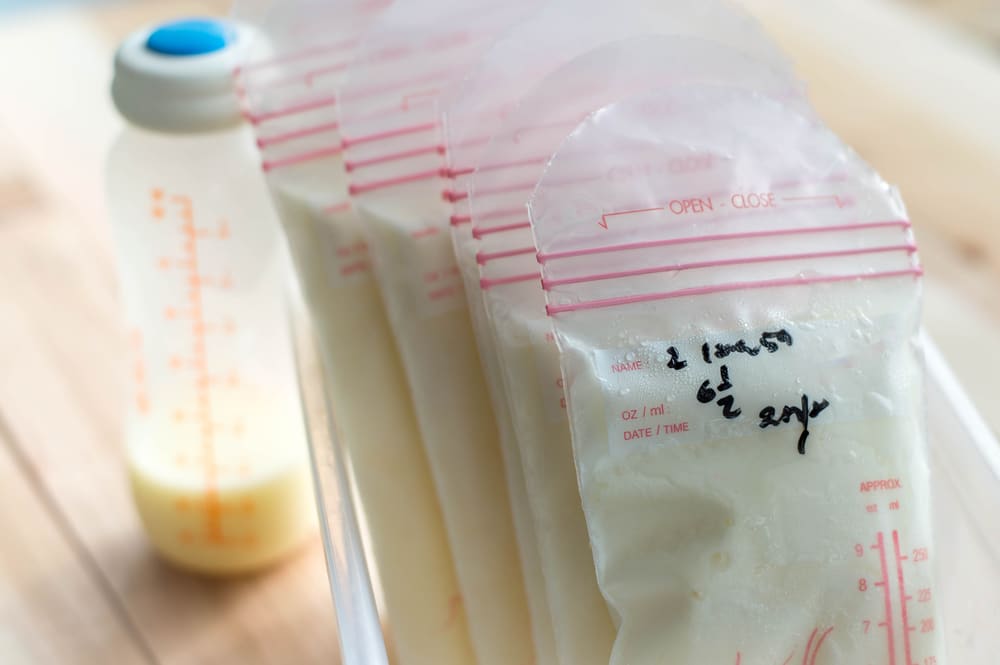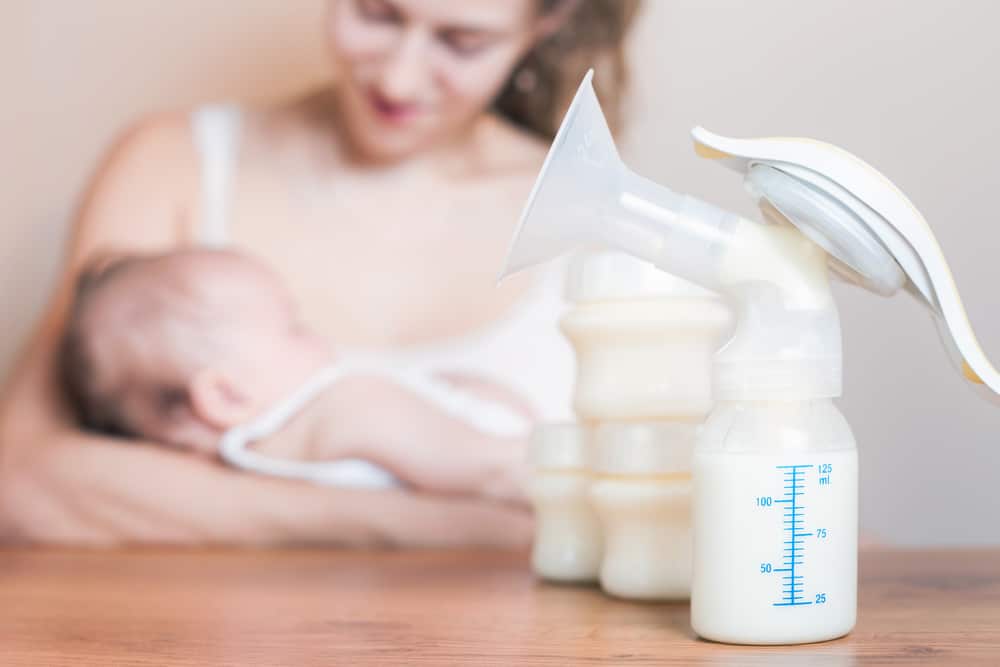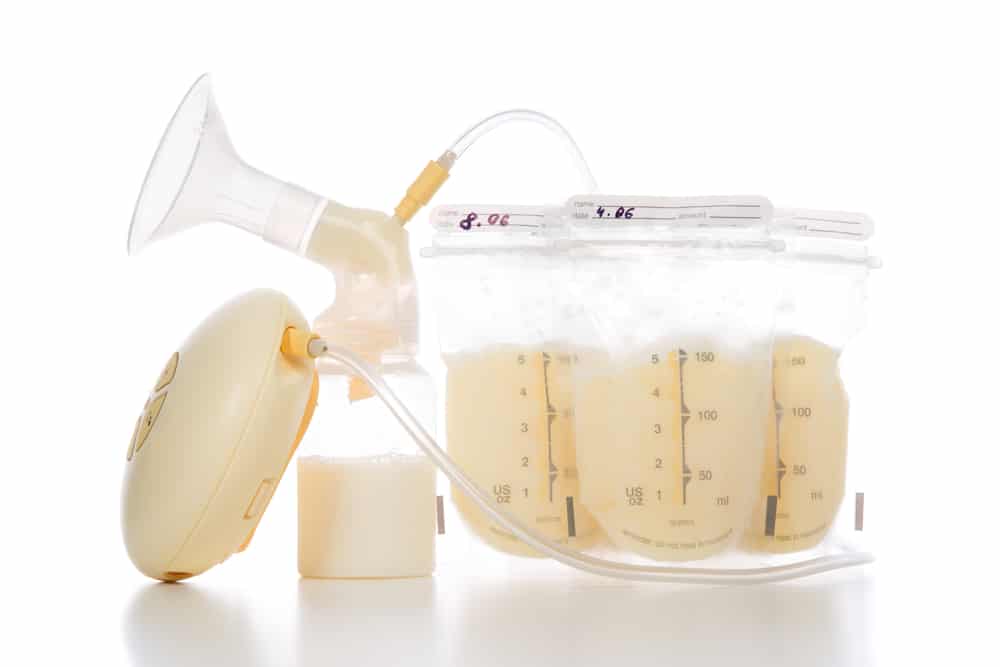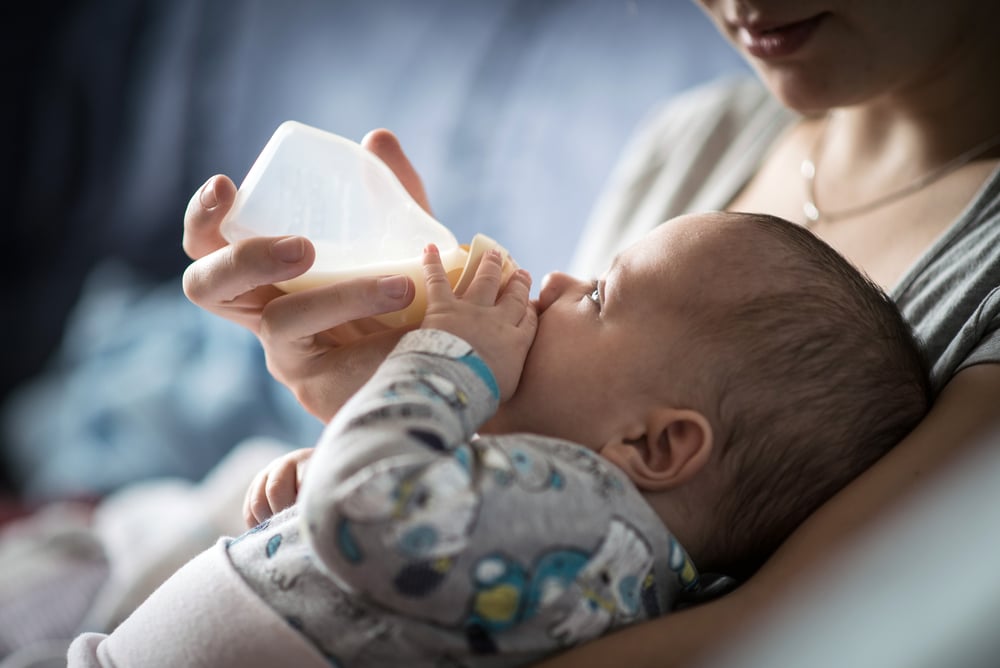Jasmine Birtles
Your money-making expert. Financial journalist, TV and radio personality.

Yes, seriously, there are women who are making money right now selling their breast milk!
It’s a surprising trade – and a controversial one – but it has been on the rise in America and the UK over the last few years, largely thanks to the internet.
Lactating women are producing extra milk, storing it and selling it to new parents through specialist agencies.
That would help pay toward the cost of having a baby, wouldn’t it?
Fascinated by the idea? Appalled by it?
Read on…

Breast milk is in great demand as there are huge benefits in it for newborn babies.
The ‘healthy’ ingredients contained in formula milk are man-made and therefore don’t have the healthy natural nutrients that breast milk does.
Also, the living substances in breast milk are easily digestible and much healthier for the baby.

The popularity of selling breast milk has increased radically with The World Health Organization confirming that
“The best food for a new born infant is breast milk from another healthy mother, if the infant’s mother cannot breast feed herself.”
Many mothers who can’t breastfeed, for one reason or another, are turning to the online world and milk banks to get a supply of breast milk. Despite the internet opening up access to breast milk donation, such banks have been around for over one hundred years, with the first recorded donor milk found in Vienna in 1909.
Breastfeeding rates, when the baby is first born, have improved says La Leche League Great Britain, a breast-feeding support website.
An average of 74% of women begin to breastfeed initially when their baby is first born. But a large number of women stop after the first few weeks.
According to research from The Nuffiled Trust, the feeding rate between six to eight weeks dropped to 43% in 2017/18, with disparities also found across geographical areas in the UK. If studies were to return to these babies a few months later, they would find that only 25% are breast feeding at six months. Of this 25%, only 1% are breastfeeding exclusively.
The majority of women at six months are using infant formula to feed their babies as well, La Leche League found.
Many mothers don’t find breastfeeding easy and struggle with it, particularly when out of the house.
Some of the most common reasons for the significant drop in breast feeding, according to La Leche League, are:
However, generally-speaking, even mothers who don’t breastfeed say they would like their babies to have breast milk if possible.
Want to make money by helping new mothers? Find out how here

Mothers are selling their breast milk in two key ways:
Many women sell their breast milk online as they are over-producing and want to make a profit from the excess.
Rebecca Hudson, a mother of four, offered her breast milk to a milk bank but they rejected it, saying they were full up.
So she turned to selling it online instead and has made some good money from it.
You can see an interview she did on ITV’s This Morning here.
Hudson embraced this virtual breast milk selling business as it’s an easy way to make some quick cash.
She originally tried to donate her excess milk to a local hospital, but was told they didn’t need it.
Hudson has said that she wanted to earn a bit of extra money in time for Christmas, which is why she started selling her milk online via breast milk websites.
She sells her milk for £12.50 per 5-ounce bottle and has gained some regular customers.
Her customers are not just mothers needing to feed their babies, one of her customers includes a bodybuilder who uses the milk for nutritional purposes (ugh!)
So far she has made over £3,000!
Hudson says ‘I didn’t want to pour it away because it takes a lot of work to produce breast milk… it takes energy and time.’
You could do the same as Rebecca has, although if you read on, you might wonder if it’s a good idea for you….

Milk banks exist to collect, screen, process and dispense breast milk and provide an invaluable service to mums who can’t breastfeed their own children.
The European Milk Bank Association has recorded 233 active milk banks across Europe, with 14 more planned. However, there are only 16 milk banks in the UK, which ask for free donations to help new mothers.
There are milk banks around that will buy breast milk but they tend to be in the US.
Milk banks in the US don’t pay a huge amount and the payment can take up to 90 days to go through. This is because the milk must be screened and checked that it is safe and healthy, while milk banks must comply with the appropriate regulatory bodies. On a federal level, US-based milk banks are regulated by the Food and Drug Administration and on a state level as Tissue Banks.
The process of screening the milk is extremely safe.
Milk banks such as Mother’s Milk Cooperative pay $1 per ounce and have received positive reviews. However, to become a member, 100 ounces of milk must be donated to cover the qualification expenses of donors.
Mother’s Milk Cooperative was the first paid milk donation programme in the United States.
Mothers donate their milk and are paid for it, so this way they can make easy ‘milk money’ from home and can fund their family lives, but are advised to only donate milk once their own child is at least three months of age – to ensure their baby has a healthy supply of milk.
Milk that is sent in containing high levels of bacteria will not be accepted and there will be no payment.
Mother’s Milk Cooperative has received good reviews, with one mother commenting: ‘The perfect food is being provided in a safe way to babies while respecting the mothers who put time and care into the donation.’
We couldn’t find any UK milk banks that pay nursing mothers for their donation.
However, as the popularity of milk banks is vastly increasing, it’s possible that eventually they will start considering payment for donations also.

As with everything else, breast milk has now gone digital with sales sites springing up online.
Onlythebreast.com is a very popular breast milk trading site.
It was founded by Glenn Snow and his wife Chelly. Snow’s wife asked him to set up the website after realising, from some simple searches online, the high demand for breast milk.
The website’s Breast Milk Classified section is divided into numerous sections referring a baby’s key criteria e.g. 0-2 months, 2-6 months or milk for a premature baby.
You simply post an ad and wait to get a response.
Some ads are extremely personal, with a picture of the mother and her baby and a detailed list of the mother’s healthy diet.
Some mothers even offer references and offer evidence of their blood tests to reassure the individual buying her breast milk that they are buying from a healthy mother. However, the website doesn’t demand this (which we think is a shame – they should do). This means there is the danger that a mother’s milk is not clean or free from disease, requirements that milk banks regulate.
Snow defends the website saying, ‘The mothers are very good at screening each other. A large percentage of the donors on our site have been milk bank approved or have undergone blood tests assuring the safety of their milk’.
However, it is still a huge risk to buy breast milk for your baby online as proof of blood tests is not essential.
If you’re a mum and you want to know what benefits you could be missing out on, look here

Prices vary when selling your breast milk.
In America, mothers are charging on average $2.50 (£1.60) per ounce.
Or, to make an even larger profit, you could freeze your breast milk and sell it in bulk.
For example, you could earn $350 (just over £280) for 2,500 ounces.
This trade is expanding in the UK, where women are getting on board and selling their milk and charging on average £1 per fluid ounce, for fresh or frozen milk.
You could earn over £14,687 a year by selling 25 ounces a day at the average price of £1.60 – if you could produce this amount of milk! Across the UK, some women have sold four fluid ounces for £15.00. However, they have received lukewarm reviews, as most of their buyers seem to be men who are stocking up on the milk for health reasons.

As the demand for breast milk grows, some mothers are even selling their breast milk on social media sites such as Facebook.
Similar prices are being charged with one fluid ounce going up for £1.
Mothers are connecting with other mothers to buy their milk.
However, there seem to be no checks in place to screen the milk and make sure it is safe.
Mothers are being tempted to buy milk via social media because it’s cheap and easy. But there have been significant warnings against buying breast milk online.
The Department of Health and Social Care has told mothers ‘not to buy milk online unless they can ensure it is safe.’
The Association for Milk Banking warns against ‘unregulated sales over the internet.’

The sharing of breast milk through popular websites does not come without risks, with health professionals and the Department of Health and Social Care warning against this practice.
Although breast milk is a healthier option for a baby than infant formula milk, doctors in Germany have warned that it’s extremely dangerous to obtain breast milk online.
The Professional Association of Pediatricians in Germany has said, ‘Mothers unable to breast feed should not turn to the internet. Donors can be taking medicines, drugs or have infectious diseases.
Nobody can check whether the unknown mother’s milk is harmless for the particular child. The milk’s quality could also be affected during its transportation.’
A study in America showed that some of the breast milk sold to mothers was not healthy and contained high levels of bacteria, including salmonella. A BBC Inside Out Investigation also revealed that some breast milk bought online in the UK contained E. coli, candida and pseudomonas aeruginosa.
This is very worrying and shows the potential dangers to babies from buying breast milk via these websites that, at the end of the day, are only seeking a profit.
If you need a supply of breast milk, it is safer to go through milk banks as they accept milk donors based on their medical history. They also require the donor to do a blood test to make sure the milk is entirely safe and free of disease.
Although here at MoneyMagpie we understand the need for making money and we encourage our readers to find new and easy ways of doing so, we’re not very happy about this.
We think that popular sites such as Onlythebreast.com should take responsibility and call for sufficient checks to be done on all donors. This should be a standard requirement and essential as babies’ lives could be put in danger.
Currently Onlythebreast.com takes no responsibility for the milk supplied on their website and babies are unprotected. Studies show that milk that has been donated in the past via websites has been potentially very harmful.
Mothers buying breast milk online can never know if the milk is completely safe and this milk could be harmful to babies. Mothers will never truly know the health of the donor and their medical history.
The Department of Health and Social Care encourages mothers to not buy milk online and warns of the dangers and heavy risks. They advise mothers to use milk banks instead as the online sites are unregulated.

The baby boom in the breast milk trade is clear from the hundreds of ads on Onlythebreast.com and there is evidence that people are getting good money for it.
Onlythebreast.com currently has 14,000 members worldwide.
It’s a popular business and you can make a good profit as babies need 19-30 ounces of milk a day to be healthy from one to six months.
The selling of breast milk through online websites has increased as many mothers complain that buying breast milk from non-profit milk banks can be very expensive. They charge $5 an ounce.
Also, more women are buying breast milk online instead of visiting milk banks. This is because it is a more immediate process and you can get breast milk more quickly this way.
In addition, free milk banks offer priority to sickly and premature babies – as they should do – but this means that it can be difficult to get hold of and these banks only have limited storage capacity.

If you’re interested in donating milk to milk banks they are always needing more.
Donating milk is incredibly rewarding and it’s a precious gift you can give to a baby.
Your milk can make a huge difference to a baby’s life and can help save the lives of premature and sick babies, whose mothers can’t breast feed themselves.
If you’re interested in donating your milk there are currently 17 milk banks across the UK and the United Kingdom Association for Milk Banking website can help you locate them.
However, none of them pay…they all ask for free donations. It’s something you should do if you want to help other mothers.
Below is a list of some of the milk banks we found in the UK:
Have you made money selling your breast milk?
Do you think it’s a good idea or is it just yukky?
Should websites be forced to demand blood tests from sellers?
Does the market need regulation?
Tell us in the comments section below.

My girlfriend (and I) have recently had a little baby girl and my girlfriend has been having to express constantly. We have so much breast milk (over 100 8/9 ounce bottles, so thats ). Our baby is just 9 weeks old and the bottles are individually dated since birth. Frozen on day of production. Call or whatsapp/sms on 07828 515 001
No alcohol consumption
No Smoking
No caffeine consumption
Organic Only Diet
No Dairy consumption
No prescribed medications
Hi
I am looking for milk for my little one because I have found out that I have got breast cancer plus I am disabled person to
WHERE CAN YOU SELL BREAST MILK IN TH UK?
Would love too bye som from
You?!
Hi Michael, I’ve got a newborn and looking to sell my oversupply if you’re interested
It could help someone out who is struggling with breast feeding.
Hello
This article (and above comment) assumes that the milk is only intended for babies, in which case I agree that the morality is questionable and could put babies at risk. However, there are others who may wish to purchase breast milk, for example, body builders. This is easier for women because the milk doesn’t need to be so sterile and blood tests etc are not as important. In which case, this is simply a case of supply and demand.
People happy to pay for cows to be milked and drink that cows milk but not for a human to be milked humanely and pay for that milk lol
My eldest son who was 8 weeks premature benefited massively from donated breast milk which was freely donated. Thank goodness there are generous mothers out there who produce surplus breast milk. I can’t believe that Jasmine is suggesting selling this milk to make a profit- absolutely immoral, in my opinion.
Expressing milk takes a lot of time and energy. why is it imoral to sale breast milk but not imoral to sell your sperm? your baby has received such a precious help but a thank you doesn’t feed anyone. We need money to survive and i am sure that those moms that helped your baby, would have been happy to receive a small donation from you! my opinion